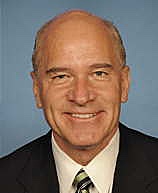NIH Action Plan for Future of Lupus Research Presented to US Congress

A new lupus research plan to guide work toward a cure was introduced on
Wednesday, March 16, in a special briefing to the U.S. Congress. The briefing was presented by the Lupus Federal
The briefing was presented by the Lupus Federal
Working Group, which includes the lupus advocacy organizations Alliance for Lupus Research (ALR), the
(ALR), the  Lupus Research Institute (LRI), and the Lupus and Allied Diseases Association, in conjunction
Lupus Research Institute (LRI), and the Lupus and Allied Diseases Association, in conjunction
with the Congressional Lupus Caucus — a bipartisan group of House of Representatives members concerned about the autoimmune disease.
Organizers maintain that this new National Institutes of Health (NIH) Action Plan for Lupus Research, developed under the direction of the National Institute of Arthritis and Musculoskeletal and Skin Diseases (NIAMS) on behalf of the NIH, is of importance to the 1.5 million Americans living with lupus — a chronic autoimmune disorder that causes inflammation and tissue damage to any organ system in the body. The health effects of lupus may also include heart attacks, strokes, seizures, and organ failure.
The original plan for The Future Directions of Lupus Research — a broad and strategic initiative to guide the nation’s investment in lupus research published in August 2007, was a response to advocacy work by the Lupus Research Institute and its National Coalition of patient advocates throughout the country, under the the leadership of NIAMS Director Stephen I. Katz, MD, PhD
 In early 2015, the Lupus Foundation of America asked the Congressional Lupus Caucus to request an update to the 2007 report, “The Future Directions of Lupus Research.” The result is the new “Action Plan for Lupus Research,” released Jan. 13, which presents a comprehensive roadmap based on decades of data derived from NIH research efforts and an improved understanding of how lupus works. It is hoped the plan will ultimately lead to safer, more effective lupus treatments and, eventually, curative strategies. However, increased federal funding for the NIH is needed to meet the goals outlined.
In early 2015, the Lupus Foundation of America asked the Congressional Lupus Caucus to request an update to the 2007 report, “The Future Directions of Lupus Research.” The result is the new “Action Plan for Lupus Research,” released Jan. 13, which presents a comprehensive roadmap based on decades of data derived from NIH research efforts and an improved understanding of how lupus works. It is hoped the plan will ultimately lead to safer, more effective lupus treatments and, eventually, curative strategies. However, increased federal funding for the NIH is needed to meet the goals outlined.
 Representative William Keating (D-MA), one of four co-chairs of the Congressional Lupus Caucus, noted: “Autoimmune diseases like lupus are very difficult to diagnose and treat. The Caucus is proud of what we have achieved, and we are on the cusp of seeing great breakthroughs. We are making progress that must keep going.”
Representative William Keating (D-MA), one of four co-chairs of the Congressional Lupus Caucus, noted: “Autoimmune diseases like lupus are very difficult to diagnose and treat. The Caucus is proud of what we have achieved, and we are on the cusp of seeing great breakthroughs. We are making progress that must keep going.”
 “Current lupus research has placed us at a tipping point. Great progress could occur with increased and dedicated federal research funding efforts, strong partnerships across institutions and additional public and private partnerships,” says Gary S. Gilkeson, MD, professor of Medicine/Microbiology and Immunology at the Medical University of South Carolina, and chair of the Lupus Foundation’s Medical-Scientific Advisory Council (MSAC). “The Action Plan for Lupus Research will help to prioritize and increase progress in lupus research, allowing researchers to take full advantage of opportunities to increase understanding of lupus at the molecular level.”
“Current lupus research has placed us at a tipping point. Great progress could occur with increased and dedicated federal research funding efforts, strong partnerships across institutions and additional public and private partnerships,” says Gary S. Gilkeson, MD, professor of Medicine/Microbiology and Immunology at the Medical University of South Carolina, and chair of the Lupus Foundation’s Medical-Scientific Advisory Council (MSAC). “The Action Plan for Lupus Research will help to prioritize and increase progress in lupus research, allowing researchers to take full advantage of opportunities to increase understanding of lupus at the molecular level.”
Among the key themes and research focus areas suggested in recommendations submitted by the MSAC are increased emphasis on partnerships in epidemiology, the validating of lupus biomarkers(i.e., the proteins, genes, etc., that are useful for diagnosing the disease, measuring its activity, or measuring the effects of treatment), and health disparities.
The Foundation says the updated Action Plan for Lupus Research, as well as the recently released National Public Health Agenda for Lupus, will help guide efforts to reduce time to diagnosis, and aid in the development of programs and services of benefit to people with lupus, their caregivers, and healthcare providers, as well as the development of new treatments and clinical trial models.
 Rep. Tom Rooney (Republican-Florida), one of the Congressional Lupus Caucus’s four co-chairs, said: “Lupus patients should be hopeful that this new plan will bring positive changes to their lives. Our Caucus thanks the Lupus Research Institute and the Alliance for Lupus Research for working with us to organize this briefing to highlight this plan and the challenges ahead to finding a cure for lupus.”
Rep. Tom Rooney (Republican-Florida), one of the Congressional Lupus Caucus’s four co-chairs, said: “Lupus patients should be hopeful that this new plan will bring positive changes to their lives. Our Caucus thanks the Lupus Research Institute and the Alliance for Lupus Research for working with us to organize this briefing to highlight this plan and the challenges ahead to finding a cure for lupus.”
 “Continuing to advance research is a critical goal of the Congressional Lupus Caucus,” says Rep. Ileana Ros-Lehtinen (Republican-Florida), caucus co-chair. “The new Action Plan represents a path lined with possibilities for those living with lupus, including my step-daughter. Through her experiences, our family knows how hard living with lupus can be, so I am committed to helping improve the quality of life for those suffering from this challenging disease.”
“Continuing to advance research is a critical goal of the Congressional Lupus Caucus,” says Rep. Ileana Ros-Lehtinen (Republican-Florida), caucus co-chair. “The new Action Plan represents a path lined with possibilities for those living with lupus, including my step-daughter. Through her experiences, our family knows how hard living with lupus can be, so I am committed to helping improve the quality of life for those suffering from this challenging disease.”
 “The purpose of the Action Plan for Lupus Research includes improving the health and well-being of individuals with lupus through research and research training as well as providing a resource for investigators as they develop independent approaches to address scientific opportunities in lupus”, observes NIAMS’ Dr. Stephen Katz.
“The purpose of the Action Plan for Lupus Research includes improving the health and well-being of individuals with lupus through research and research training as well as providing a resource for investigators as they develop independent approaches to address scientific opportunities in lupus”, observes NIAMS’ Dr. Stephen Katz.
The group of speakers discussing how this research plan will help provide better and safer treatments for the lupus community, also included:
 Robert H. Carter, MD, deputy director, National Institute of Arthritis and Musculoskeletal and Skin Diseases (NIAMS) at the NIH;
Robert H. Carter, MD, deputy director, National Institute of Arthritis and Musculoskeletal and Skin Diseases (NIAMS) at the NIH;
 Stefania Gallucci, MD, a lupus researcher and associate chair of Microbiology and Immunology at Temple University’s Lewis Katz School of Medicine;
Stefania Gallucci, MD, a lupus researcher and associate chair of Microbiology and Immunology at Temple University’s Lewis Katz School of Medicine;
 Molly McCabe, a Lupus patient and co-founder, Molly’s Fund Fighting Lupus.
Molly McCabe, a Lupus patient and co-founder, Molly’s Fund Fighting Lupus.
 In a video message, the director of the National Institutes of Health, Francis S. Collins, MD, spoke about why lupus patients might anticipate great advances in research, observing: “My hope would be that we take this exceptional scientific moment and unleash all of the talent of those investigators out there who are ready to push back the frontiers and discover all kinds of things about what causes lupus and what can we do about it.”
In a video message, the director of the National Institutes of Health, Francis S. Collins, MD, spoke about why lupus patients might anticipate great advances in research, observing: “My hope would be that we take this exceptional scientific moment and unleash all of the talent of those investigators out there who are ready to push back the frontiers and discover all kinds of things about what causes lupus and what can we do about it.”
Sources:
Lupus Research Institute
Alliance for Lupus Research
Lupus Foundation of America
Lupus and Allied Diseases Association
Congressional Lupus Caucus
National Institutes of Health (NIH)






